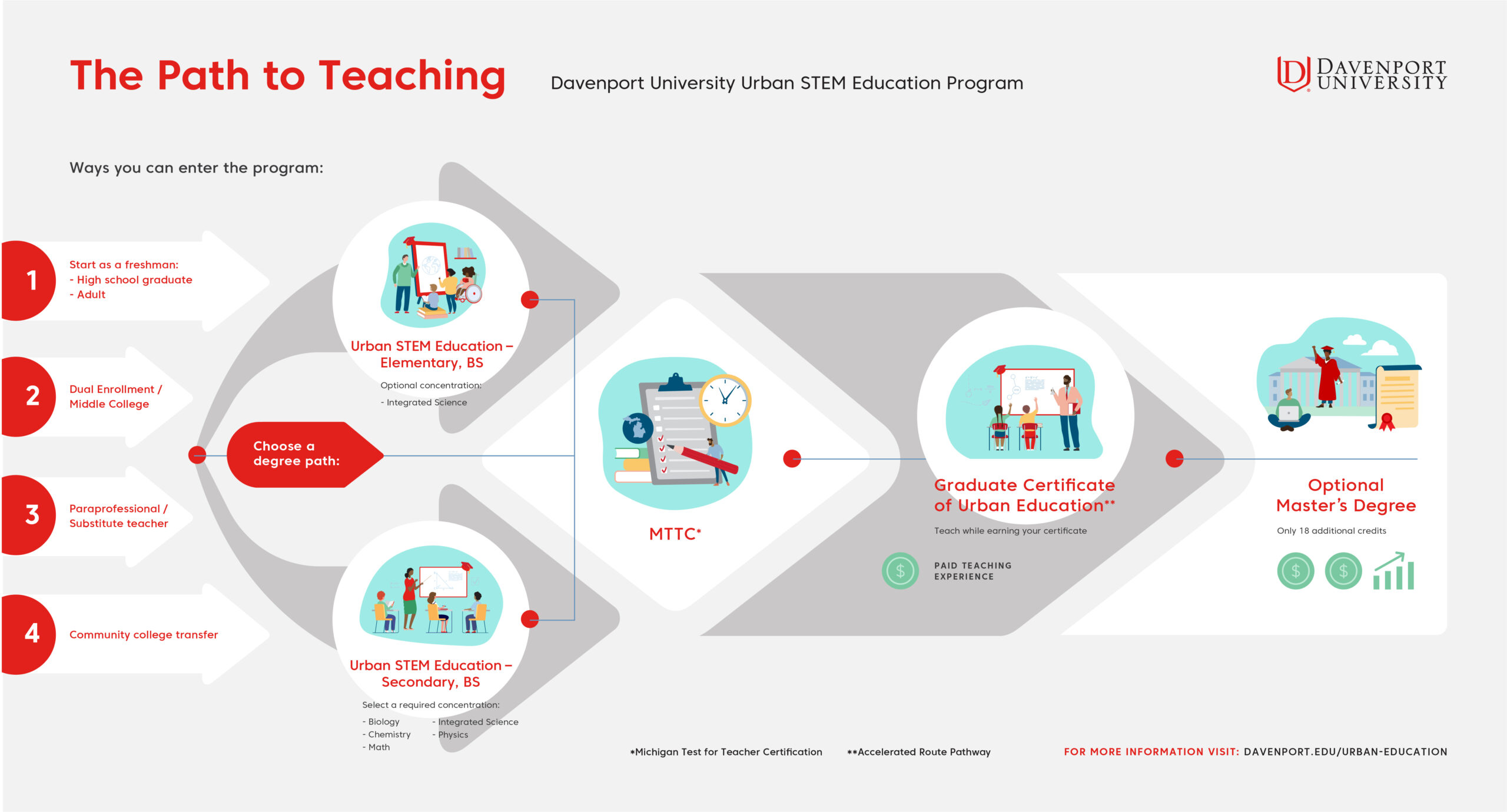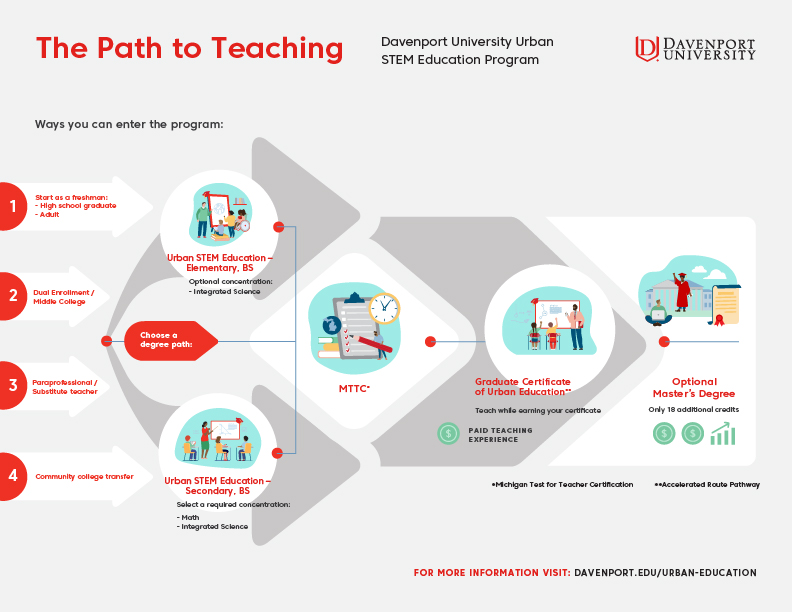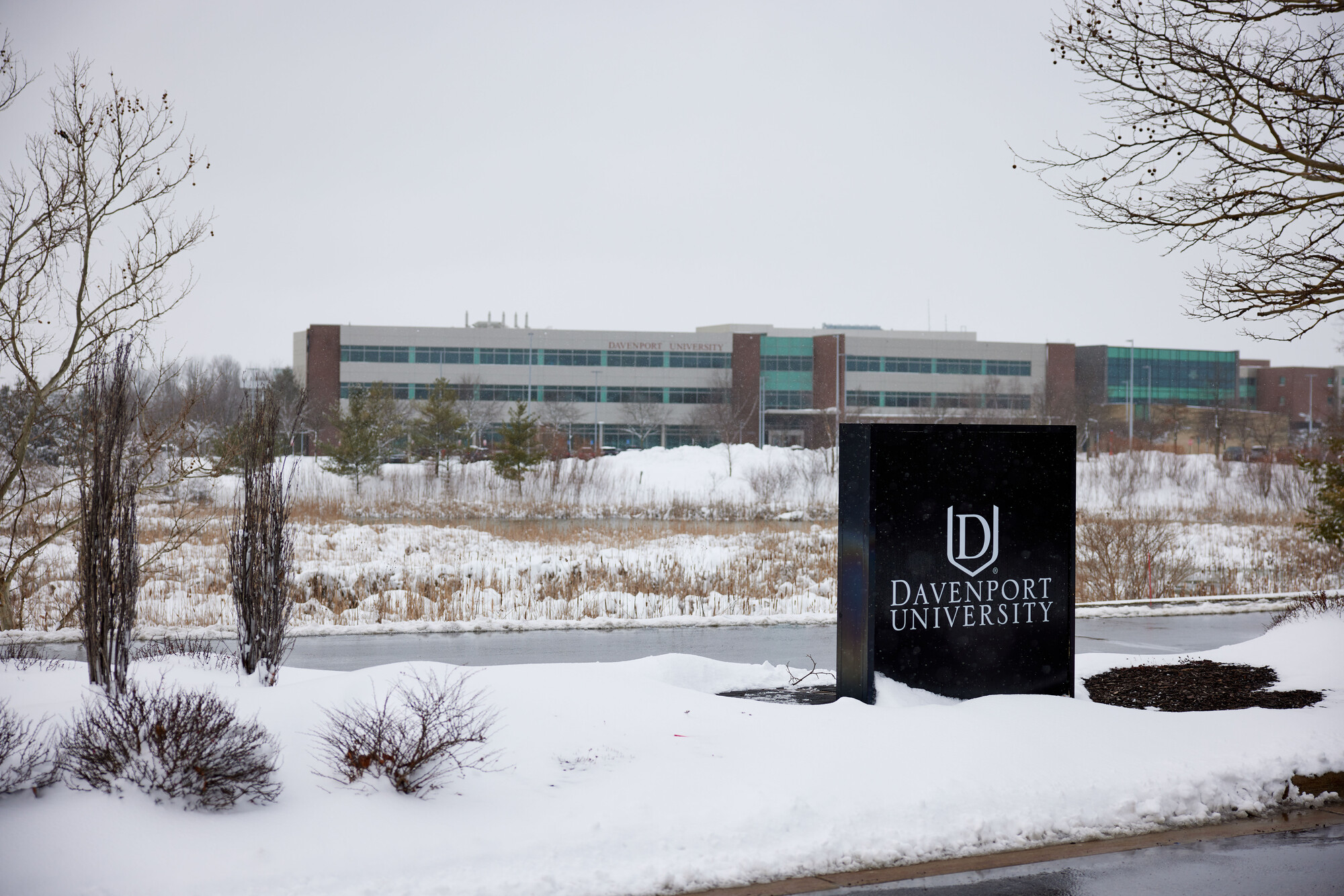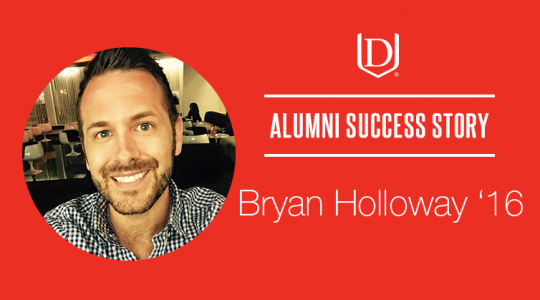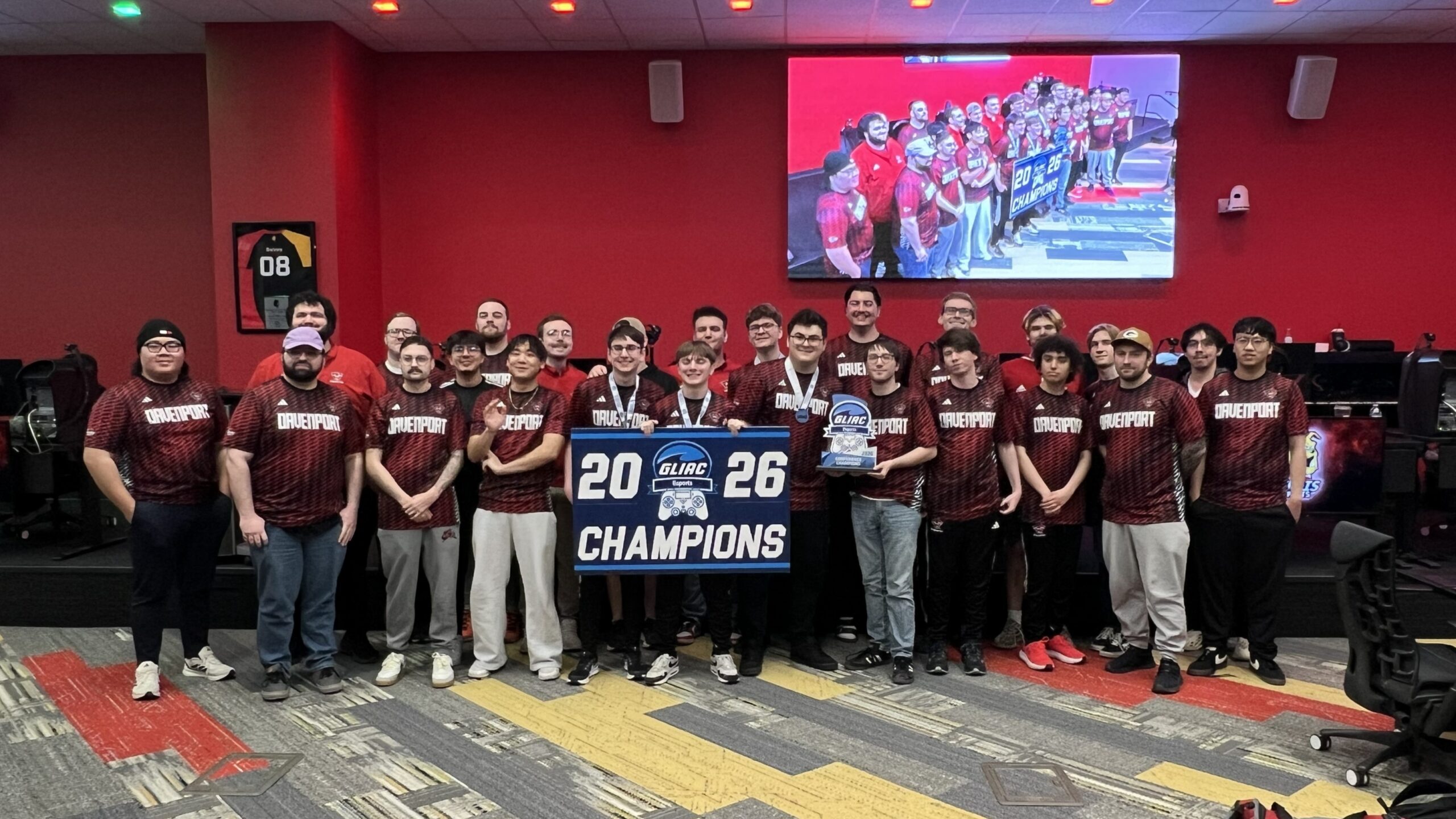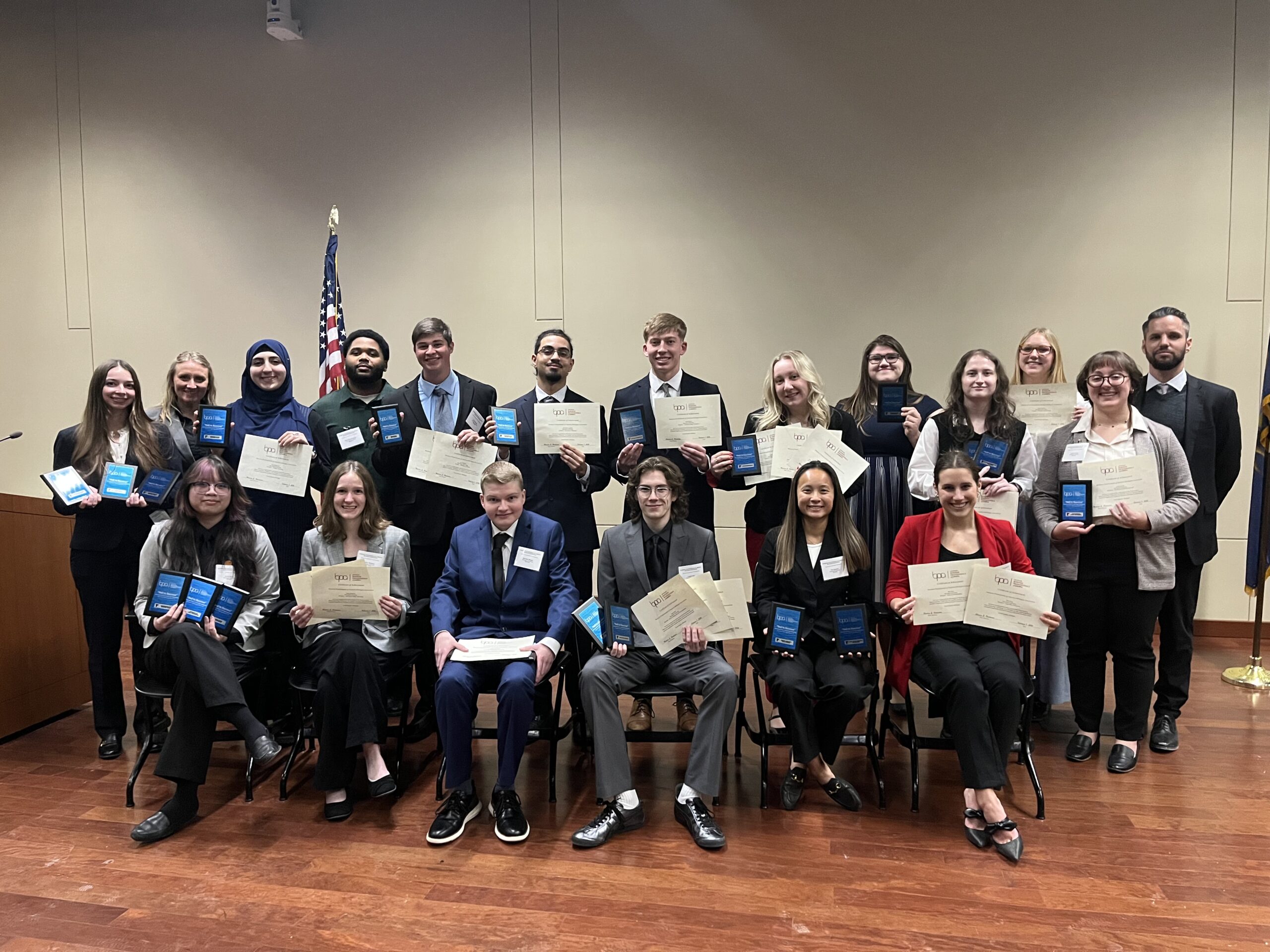Bachelor of Science in urban STEM education uniquely positions educators for success in the classroom, addresses employee retention
(Grand Rapids, Mich. – November 15, 2021) Michigan’s education system is facing an alarming teacher talent crisis, and nowhere is this felt more profoundly than in urban school districts. In response, Davenport University has launched a new specialty degree program, a Bachelor of Science in urban STEM education, to develop elementary and secondary teachers with deep expertise in K-12 STEM instruction and culturally responsive teaching strategies to empower them and their students intellectually, socially, and emotionally.
Two degrees will be offered: An Elementary, Bachelor of Science degree with an optional concentration in Integrated Science, and a Secondary, Bachelor of Science degree with concentrations.
According to a Michigan Educators Survey, teacher retirements are up 44% since August 2020, while 18,000 educators are eligible for retirement and 12,000 are eligible for early retirement. This growing retirement trend exacerbates an already difficult talent shortage for urban schools, which currently sees as many as 70% of new teachers leave their position within five years.
“We’re seeing teachers and administrators continually challenged with access to adequate resources to support students in urban schools,” said Dr. Richard Pappas, Davenport University President. “Davenport’s College of Urban Education curriculum is designed to address these challenges. In addition, with our Master’s Degree programs, we’ve seen measurable success in academic performance in the classroom and overall teacher retention rates. It’s time we shared these learnings with those seeking Bachelor’s certification.”
According to the National Student Clearinghouse Research Center, only 27% of high school students from schools with low-income and high diversity complete college within six years, a 24-percentage point gap compared to students from higher-income and less-diverse schools at 51%.
“We’ve found that integrating students’ cultural knowledge, prior experiences, and providing a frame of reference makes learning encounters more relevant and effective,” said Pappas. “It’s essential we help teachers develop the unique skills needed to serve within urban skills and equip them to meet students where they are and help them succeed academically.”
Davenport’s urban education curriculum is unique in many ways. Its faculty and staff are committed to preparing aspiring educators to bring equity, creativity, and opportunity to increasingly diverse communities. This is done through an aggressive, robust weekly mentoring and coaching program with 1-on-1 data-informed feedback starting in the first year of the program.
Flexible class schedules include real-time virtual online education courses combined with in-person STEM courses offered across campuses in Detroit, Grand Rapids, and Lansing.
While Davenport’s education program focuses heavily on teaching in large, urban areas with diverse populations, the knowledge and skills students acquire through these programs can be applied to all primary and secondary educational settings.
“The teacher shortages Michigan is facing are critical,” said Pappas. “We believe that the long-term success of our economy rests on the success of Michigan’s youth and the teachers that are helping them achieve their greatest potential.”
To apply or view the curriculum go to davenport.edu/urban-education or call 800.686.1600 to speak with an admissions representative.
Share This Story!
Bachelor of Science in urban STEM education uniquely positions educators for success in the classroom, addresses employee retention
(Grand Rapids, Mich. – November 15, 2021) Michigan’s education system is facing an alarming teacher talent crisis, and nowhere is this felt more profoundly than in urban school districts. In response, Davenport University has launched a new specialty degree program, a Bachelor of Science in urban STEM education, to develop elementary and secondary teachers with deep expertise in K-12 STEM instruction and culturally responsive teaching strategies to empower them and their students intellectually, socially, and emotionally.
Two degrees will be offered: An Elementary, Bachelor of Science degree with an optional concentration in Integrated Science, and a Secondary, Bachelor of Science degree with concentrations.
According to a Michigan Educators Survey, teacher retirements are up 44% since August 2020, while 18,000 educators are eligible for retirement and 12,000 are eligible for early retirement. This growing retirement trend exacerbates an already difficult talent shortage for urban schools, which currently sees as many as 70% of new teachers leave their position within five years.
“We’re seeing teachers and administrators continually challenged with access to adequate resources to support students in urban schools,” said Dr. Richard Pappas, Davenport University President. “Davenport’s College of Urban Education curriculum is designed to address these challenges. In addition, with our Master’s Degree programs, we’ve seen measurable success in academic performance in the classroom and overall teacher retention rates. It’s time we shared these learnings with those seeking Bachelor’s certification.”
According to the National Student Clearinghouse Research Center, only 27% of high school students from schools with low-income and high diversity complete college within six years, a 24-percentage point gap compared to students from higher-income and less-diverse schools at 51%.
“We’ve found that integrating students’ cultural knowledge, prior experiences, and providing a frame of reference makes learning encounters more relevant and effective,” said Pappas. “It’s essential we help teachers develop the unique skills needed to serve within urban skills and equip them to meet students where they are and help them succeed academically.”
Davenport’s urban education curriculum is unique in many ways. Its faculty and staff are committed to preparing aspiring educators to bring equity, creativity, and opportunity to increasingly diverse communities. This is done through an aggressive, robust weekly mentoring and coaching program with 1-on-1 data-informed feedback starting in the first year of the program.
Flexible class schedules include real-time virtual online education courses combined with in-person STEM courses offered across campuses in Detroit, Grand Rapids, and Lansing.
While Davenport’s education program focuses heavily on teaching in large, urban areas with diverse populations, the knowledge and skills students acquire through these programs can be applied to all primary and secondary educational settings.
“The teacher shortages Michigan is facing are critical,” said Pappas. “We believe that the long-term success of our economy rests on the success of Michigan’s youth and the teachers that are helping them achieve their greatest potential.”
To apply or view the curriculum go to davenport.edu/urban-education or call 800.686.1600 to speak with an admissions representative.
Share This Story!
Stay connected!
Get the latest Davenpost News delivered to your inbox!
Related Stories
The first weeks of the coronavirus pandemic were challenging for companies as they tried to make sense of what COVID-19 [...]
Davenport University faculty members are known for investing deeply in their students, but their work and influence often extend beyond [...]
Bryan Holloway, ’16 MBA, joined Kellogg’s nearly 11 years ago as a machinist. But, thanks to amazing mentors and leaders [...]
Latest Stories
Over a high-stakes weekend at Ferris State University on February 14th and 15th, Davenport University Esports solidified its status as [...]
Davenport University has announced a new master's degree in nursing that prepares nurses for advanced careers as clinical nurse leaders. [...]
Davenport University’s Business Professionals of America (BPA) students once again took top honors at the recent Postsecondary State Leadership Conference, [...]

